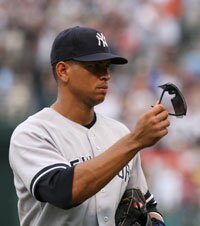THE SPORTS DOCTOR- Union card: A-Rod has nothing to fear

Rodriguez: "You'll have to talk to the union."
PHOTO BY KEITH ALLISON
I grew up in Burkeville, not Detroit, so I didn't know what a union was until I read Upton Sinclair's The Jungle in tenth grade. I was thrilled to know someone was keeping the rat droppings out of my hot dogs.
It wasn't until a railroad friend told me how an engineer who snorted cocaine at work kept both his job and his pension that I realized what purpose unions really serve– and it doesn't seem to have anything to do with hot dogs.
When a Sports Illustrated reporter recently confronted Alex Rodriguez about testing positive for steroids in 2003, his only response was, "You'll have to talk to the union."
Not, "You'll have to talk to my lawyer," or "No comment," but, "You'll have to talk to the union."
Why? Has A-Rod suddenly turned a modern-day Sally Field, standing atop his sewing machine, fighting for higher wages? Is he Jimmy Hoffa, refusing to unload strawberries until he gets an insurance plan?
Why is Rodriguez suddenly ready to take one on the chin for the union?
Everyone knows the Major League Baseball Players Association is the yardstick by which all other professional sports associations are measured. Even the grotesquely rich NFL knows that. Not a day went by that the late NFL Players' Association chief Gene Upshaw didn't get smacked in the face with the MLB. You don't read about old pitchers fighting their union to get elbow surgery, do you? If there's one union that takes care of its own, it's the MLB.
Boy, does it ever, both coming and going! The baseball union is a player's mother, father, brother, sister, therapist, priest, doctor, lawyer, babysitter, godfather, bodyguard, judge and jury all rolled into one. When A-Rod told Sports Illustrated to "talk to the union," he wasn't so much deflecting a question as he was putting himself in protective custody.
A-Rod may be egomaniacal and a post-season liability, but one thing he's not is stupid. This drama isn't about him at all; it's about the Players Association. If Rodriguez keeps his mouth shut, all those positive tests will come out in the wash. When it comes to a rumble, no one ever bests the MLB Players Association.
How could they? The Players Association is holding all the cards. The union decides which players get tested, what they're tested for, when and how frequently they're tested, whether the tests are anonymous, what lab will process the tests, and what, if any, the penalties will be for a positive result. Throw in a couple of court orders that make everything confidential, and you've got an organization that can confidently thumb its nose at a Congressional committee.
"I wrote a letter to (MLB Players Association head) Don Fehr's office setting forth the names and the dates, and I wanted to tell them, ‘Here is what happened, come in and explain it to me,'" Senator George Mitchell told CNN in 2007. "They refused to do so."
The steroids tests for which A-Rod tested positive weren't your run-of-the-mill, "Knock-knock and surprise! Fill this cup!" kinds of tests. They were special, part of a survey the MLB was conducting to determine whether mandatory drug testing was necessary. Bowing to the union's demands, the MLB performed the tests after promising the players anonymity and agreed that positive results would carry no penalties.
When Rodriguez tested positive for testosterone and the anabolic steroid Primobolan, neither he nor the Players Association expected any repercussions. According to three Major League players who spoke to Sports Illustrated, A-Rod didn't have to worry about future positives, considering he could count on Gene Orza, the chief operating officer of the union, to tip him whenever a test was coming.
And that's A-Rod's real ace in the hole. When Orza was cited in the Mitchell Report for tipping a player to an upcoming drug test, not only did the Players Association refuse to cooperate with the Senate's investigation, but they kept Orza on as COO. Orza's continuing presence can only mean one thing: he's being protected from on high; even after admitting his steroid use, A-Rod has nothing to fear.
It remains to be seen if any of the test results can be used in an investigation. It's very probable they fell outside the scope of the government's search warrant, and the Players Association won't hesitate to use that violation to the full. By protecting a juiced-up player, the union is protecting itself. That's one heck of an insurance plan.
#